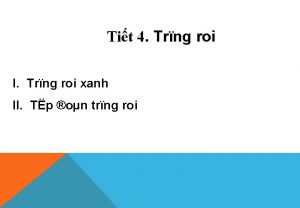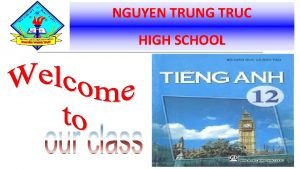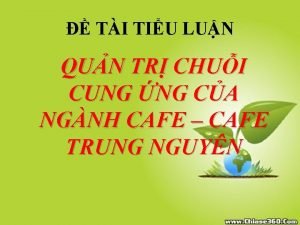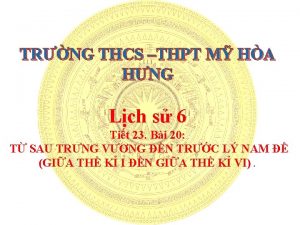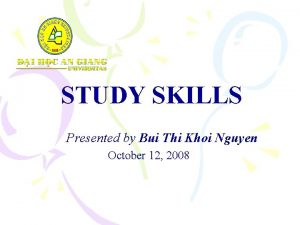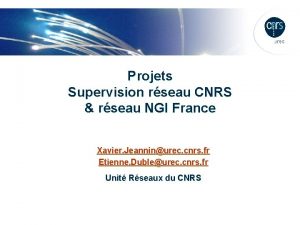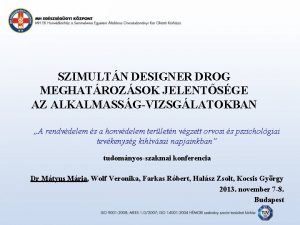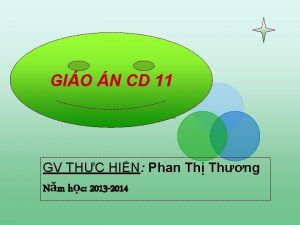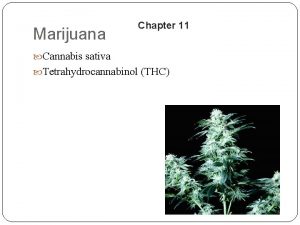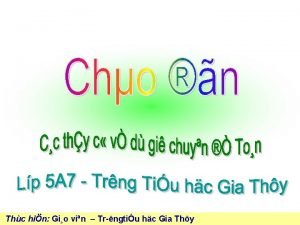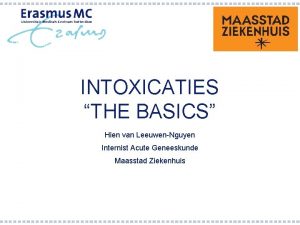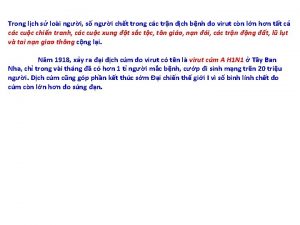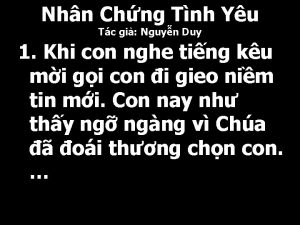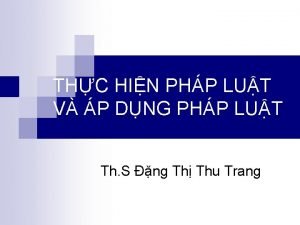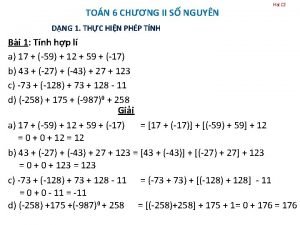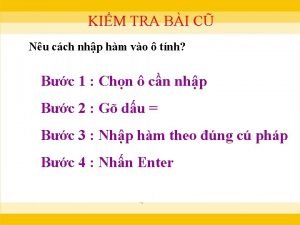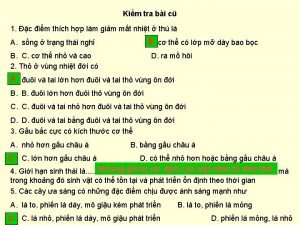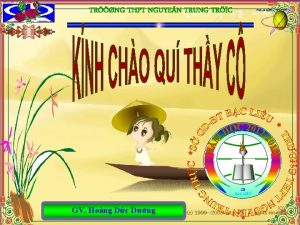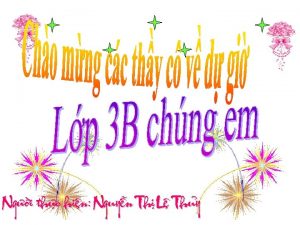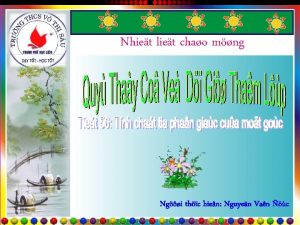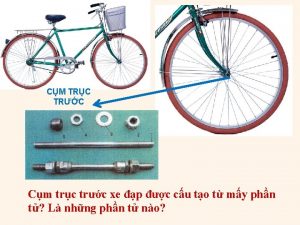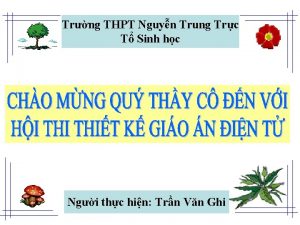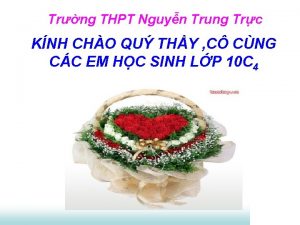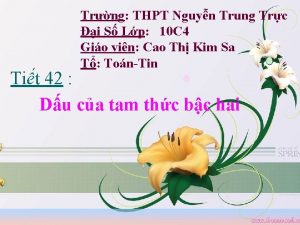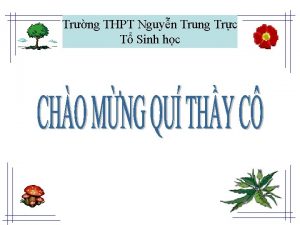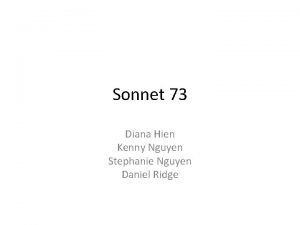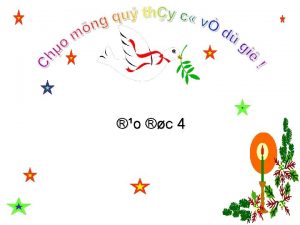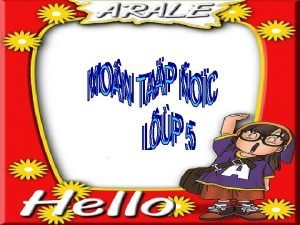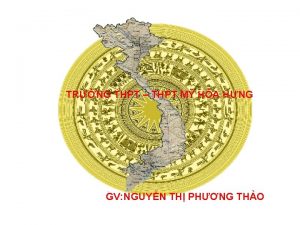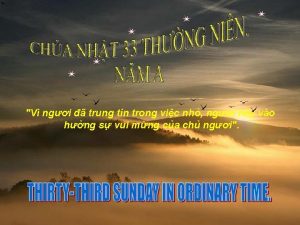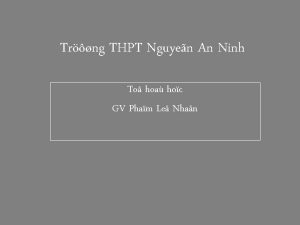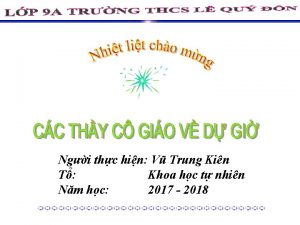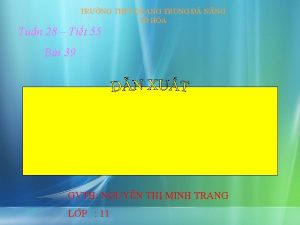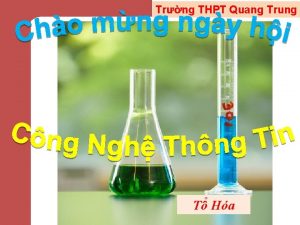Trng THPT Nguyen Trung Trc Ngi thc hien























- Slides: 23

Tröôøng: THPT Nguyeãn Trung Tröïc Ngöôøi thöïc hieän : Traàn Thò Ngoïc Ngaân

I. Homework checking II. New lesson * Warm up. 1. Before you read. 2. While you read. 3. After you read. III. Homework

Exercise: Complete the sentences below, using the words from the box. look up turn off turn on give up 1. It’s dark in here. Can I the lights? the new words in the 2. You can dictionary. 3. John got ill and had to smoking 4. the lights when you are not using them.

* WARM UP: Match the given words with the right pictures: Teaching children 1 Buying foods 4 Watching TV Working with computer 2 Wasting the rubbish 5 Eating meals 3 6


I. Before you read: a. Answer the questions: 1. How many roles does this woman have? 2. Is her life typical of a Vietnamese woman’s life? Why/Why not? b. Vocabulary: -1. Civilization /, sivəlai'zeiʃn/ (n): a state of human society is very developed and organized (neàn vaên minh) -2. childbearing (n): the process of giving birth to children (vieäc sinh con ) -3. involvement /in'vɔlvmənt/ (n): participation 4. Age of enlightenment /in'laitnmənt/ (n): thôøi ñaïi khai saùng (söï tham gia)

5. homemaking (n): working at home and taking care of the house and family (vieäc chaêm soùc gia ñình) 6. - intellectual /, intə'lektʃuəl/ (adj): mind, understanding ( trí tueä ) Ex: She is very intellectual -7. Equal /'i: kwəl/ (adj): the same -8. Advocate /'„dvəkeit/ (v): agree, support ( taùn thaønh) -9. Discriminate /dis'krimineit/ (v): distinguish to treat (phaân bieät ñoái xöû) -10. struggle /'strʌgl/ (n): a fight Ex: the struggle for independence

II. While you read Listen the tape Read the text then do the tasks that follow. Silent reading: 3’

II. While you read: task 1: Finding the meaning of words 1. Human civilization: 2. Childbearing: 3. Involvement: 4. Age of Enlightenment: 5. Deep-seated cultural beliefs: 6. Homemaking: 7. Intellectual ability: 8. Equal work opportunity:

task 1: Finding the meaning of words 1. Human civilization: nền văn minh nhân loại 2. Childbearing: sự sinh con 3. Involvement: sự tham gia 4. Age of Enlightenment: thời đại ánh sáng 5. Deep-seated cultural beliefs: niềm tin văn hóa vững chắc 6. Homemaking: làm việc nhà và chăm sóc gia đình 7. Intellectual ability: khả năng trí tuệ 8. Equal work opportunity: cơ hội làm việc bằng nhau

Task 2: Choose the best option (A, B, C or D) to answer the following questions: 1. According to the text, what was the main role traditionally accorded to women? A. working in education B. building houses C. taking care of the house and family D. working in factory

Task 2: Choose the best option (A, B, C or D) to answer the following questions: 2. Before the 18 th century, what was the attitude of society towards women’s intellectual ability? A. respectful B. supportive C. resentful D. disbelieving

Task 2: Choose the best option (A, B, C or D) to answer the following questions: 3. According to the text, what is the purpose of the struggle for women’s right? A. to free women from housework B. to establish a friendly relationship between men and women C. to bring equality between men and women D. to argue that women have better intellectual ability

Task 2: Choose the best option (A, B, C or D) to answer the following questions: 4. What do “these pioneer thinkers” at the end of paragraph 2 refer to? A. 18 th century European people B. 18 th century European political philosophers C. 18 th century European women D. 18 th century European politicians

Task 2: Choose the best option (A, B, C or D) to answer the following questions: 5. Which of the following is NOT mentioned in the last paragraph as one of women’s legal right today? A. property right B. equal pay right C. equal employment opportunity rights D. the right to vote

Task 3: Choose the best title (A, B, C or D) for the passage A. Women’s Intellectual Ability. B. The Age of Enlightenment. C. Women’s Rights. D. Women’s Role in Education.

III. /After you read: • A. /Summarise the reading passage by writing ONE sentence for each paragraph.

III. After you read: Suggest answer • 1. In the past, women were retricted to the role of mothers and wives due to widespread doubt about their intellectual ability. • 2. The struggle for women’s rights began in the 18 th century as European political philosophers believed that women should be treated equally. • 3. Women now enjoy important legal rights such as equal work opportunities and equal pay, the right to vole and to gain education.

III. After you read: B. Play game: word search Rule: Read the words listed below. Find them in the puzzle and circle them

III. After you read: women education childbearing society rights homemaking W O M E N F H A D H I Y E G T D O M V S E O K T H B O U K N O S J M P H K S K C L U T E V E O Y S I E A E H D A E M T B U D Y T G R C Y D A M U S O C I E T Y P I K D B W G R O V A M E T I E Q G E H N M B L G X N B W A P R E W N F B Z G S P C H I L D B E A R I N G R B O J E R T A F G J I

Key: Word search women childbearing education society rights homemaking W O M E N F H A D H I Y E G T D O M V S E O K T H B O U K N O S J M P H K S K C L U T E V E O Y S I E A E H D A E M T B U D Y T G R C Y D A M U S O C I E T Y P I K D B W G R O V A M E T I E Q G E H N M B L G X N B W A P R E W N F B Z G S P C H I L D B E A R I N G R B O J E R T A F G J I

III. Homework: 1. Read again the text 2. Learning the new words. 3. Summarize the reading passage by writing one sentence for each paragraph 4. Prepare : Unit 16 - lesson : 1 Reading

 Trùng roi và trùng giày
Trùng roi và trùng giày So sánh trùng kiết lị và trùng sốt rét
So sánh trùng kiết lị và trùng sốt rét Sutron data logger
Sutron data logger Trng
Trng Nguyen trung truc
Nguyen trung truc Chuỗi cung ứng của cafe trung nguyên
Chuỗi cung ứng của cafe trung nguyên Thpt mỹ hòa hưng an giang
Thpt mỹ hòa hưng an giang Nguyen tan khoi nguyen
Nguyen tan khoi nguyen Ngi france
Ngi france Pentobarbitál
Pentobarbitál Thc and fitness
Thc and fitness Thc cd
Thc cd Amotivational syndrome
Amotivational syndrome Chç
Chç Darmlavage definition
Darmlavage definition Thí nghiệm phát hiện virus của ivanopxki
Thí nghiệm phát hiện virus của ivanopxki Này đây chúa ơi con hiến dâng cho ngài
Này đây chúa ơi con hiến dâng cho ngài Muốn xoá một hoặc nhiều cột em thực hiện
Muốn xoá một hoặc nhiều cột em thực hiện Từ ngữ thể hiện lòng nhân hậu
Từ ngữ thể hiện lòng nhân hậu Các hình thức thực hiện pháp luật
Các hình thức thực hiện pháp luật Dạng 1 thực hiện phép tính
Dạng 1 thực hiện phép tính định luật phóng xạ
định luật phóng xạ Rong nhp
Rong nhp Hiện tượng tỉa thưa
Hiện tượng tỉa thưa
